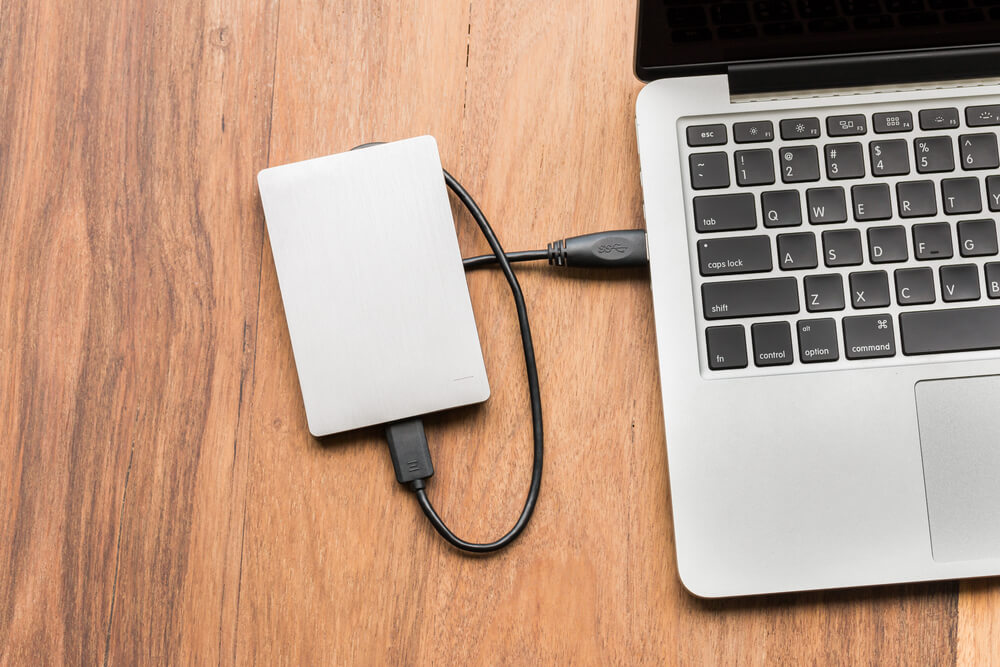
Size is just one of numerous factors determining what size of external hard drive you need. Here we will look at all the things to consider to get the hard drive you need.
When deciding on the size of external hard drive you need, you will need to think about:
- your other storage options
- what files you intend to store
- how long you want to keep files
- how portable you would like the device to be
- your budget
Internal and Cloud Storage
How much external storage you need to buy will depend partly on how much internal storage your devices have. A new laptop might come with a terabyte of storage space, which is amply for most people’s needs.
However, most people will probably not need more than 256GB of internal storage. There are many reasonably priced 256GB SSD laptops which would be more than enough enough for most.
Budget laptops, however, often sacrifice hard disk capacity to bring down the cost. If this is the case with your machine, you may wish to buy an external hard drive to get more storage space.
If your computer comes with plenty of storage space or you make use of cloud storage allocations, you can afford to go for a hard drive with less storage space. In this case, you may prioritize other factors, such as durability and transfer speed.
What Will You Be Storing?
Not all files take up similar amounts of space on a drive. If you are looking at backing up text files, for example, these file sizes are negligible by today’s standards, and you are unlikely to need a large hard drive. A high-quality, long-lasting drive will be a more important consideration.
Music and image files require more space than text files. If you plan to store your photo or music collection on a drive, storage size is more of a concern. Note that a 250GB hard drive can store over 30,000 photos (average size) or songs, which should give you an idea of how much space you need.
Also note that it’s better to buy too much space than too little. Err on the side of caution. Think about what your needs are likely to be in a year or two before purchasing a hard drive.
Movies are among the files that require the most real estate. If you intend to store movies on your hard drive, don’t shy away from a 500GB hard drive or more. The excitingly named Terabyte hard drive would not be overkill either. As the image quality of movies increases, their file sizes grow, too, so you may be surprised to discover how quickly you go through hard drive space when storing your favorites. On average, a terabyte should currently store around 250 movies.
If you are looking for a hard drive because you want to perform a backup of your computer, note that Microsoft recommends at least 200GB of storage space. As long as the external hard drive is at least as large as your internal storage, you should be okay.
Portability
Devices keep getting both smaller and more powerful. External hard drives are no exception. Most external hard drives are smaller than they would have been a few years ago and offer you a lot more storage for your movies, photos, and other files. You can get a very high-quality external hard drive with terabytes of storage space that is also extremely small and easy to use.
SSD or HDD?
A solid-state drive (SSD) will typically be more durable than a hard disk drive (HDD). You can drop an SSD, expose it to vibration, extreme temperatures, or magnetism, and it should cope better than an HDD. Of course, it’s still best to avoid all those things.
The more durable construction of an SSD comes with a cost, though. Not only will the dollar cost be impacted by the fact the drive is SSD, but they also tend to have less storage space than HDDs.
An SSD is more durable than an HDD, but neither will last forever. With careful use, you may get ten years out of one. The more transfers you perform with the drive, the shorter its potential lifespan.
Durability
This is a very important consideration of which too many people are unaware. Hard drives do not last forever. Even if you look after it, a hard drive will likely last you 3 to 5 years. This depends on the quality of the hard drive, the make and model, and how you have stored and used it.
Therefore, you should consider that you will need to replace it in a few years when you consider how much you are willing to spend and how much space you require. A hard drive can last for ten years, but it’s wise to back up your files to a new hard drive every few years to avoid disappointment. It’s also possible for a hard drive to last very little time if you end up with a poor quality make or it has been used and stored without care.
Cost
When considering how much to spend on an external hard drive, remember to factor in that they are likely to fail and require replacement after a few years. And the good thing about buying an extensive hard drive is that you will worry less about running out of space. You can also change your mind about storing movies or about how many movies you will store, and your hard drive will have the capacity to cope.
A pricier external hard drive may also offer you better transmission speeds, so you can move your movies from location to location faster. If your hard drive is not so much a backup device as a way to transfer files, it may be worth paying a little extra for high transmission speeds.
Getting a great deal on an HDD or SSD will take the sting out of the fact they don’t last forever. However, with careful use and careful selection, you can grab a great external hard drive deal that will solve your storage needs.
Share this:




